-
adminposted in News & Trends • read more

Pauline TallenBy Justina Auta
The Minister of Women Affairs, Mrs Pauline Tallen, has been conferred with an award by the UN Global Women Foundation Advocacy for Change, a global body.
Mr Olujimi Oyetomi, the Director, Press and Public Relations, Federal Ministry of Women Affairs, disclosed this
in a statement on Wednesday in Abuja.He stated that the award is for her lifelong commitment toward building strong reach of service throughout the world.
Oyetomi added that the award was presented to the minister during the She Rises Forum on Empowering Women Economic Sustainability Through Entrepreneurship and Leadership holding on the wings of the 67th Session of UN Commission on the Status of Women in New York.
He said this special recognition by the global body adds to many that have been conferred on the Nigerian
Minister of Women Affairs.It is specially for her lifelong commitment to building strong reach of service throughout the world.
The passion and commitment of Dame Tallen to positively change the lives of women and girls is infectious.
It does not take long for anyone to stay around the Plateau State, Nigeria-born administrator and public
servant to detect her high level and tireless commitment and passion in this regard. (NAN)(www.nannews.ng)Edited by Abiemwense Moru/Hadiza Mohammed-Aliyu
Source: NAN News
-
adminposted in News & Trends • read more
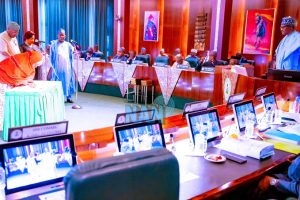
Buhari swears-in ICPC Board membersBy Ismaila Chafe
President Muhammadu Buhari has sworn in seven members of the Board of the Independent Corrupt Practices and other related offences Commission (ICPC).
The News Agency of Nigeria (NAN) reports that the inauguration took place at the Council Chambers of the Presidential Villa, Abuja, on Wednesday.
The affected members include retried Justice Adamu Bello (Katsina State); Hannatu Mohammed (Jigawa); Olubukola Balogun (Lagos State); Obiora Igwedibia (Anambra); Dr Abdullahi Saidu (Niger); Yahaya Dauda (Nasarawa State) and Grace Chinda from Rivers.
The event preceded the commencement of the weekly meeting of the Federal Executive Council (FEC).
Those at the FEC meeting include Vice-President Yemi Osinbajo, Secretary to Government of the Federation, Boss Mustapha and the National Security Adviser, retired Maj-Gen. Babagana Monguno.
Others are Ministers of Works and Housing, Babatunde Fashola, Aviation, Hadi Sirika, Finance, Zainab Ahmed, Women Affairs, Pauline Tallen and that of the Federal capital Territory, Mohammed Bello among others. (NAN) (www.nannews.ng)
Edited by Joseph Edeh
Source: NAN News
-
adminposted in News & Trends • read more

By Taiye OlayemiThe Chinese Community in Nigeria in collaboration with Hua Xing Arts Troupe, Nigeria, has organised a symposium in celebration of the 2023 International Womens Day.
The symposium with the theme, Dedication to the Society and Embrace Equity, was aimed at celebrating womens achievements, raising awareness and creating opportunities that drive gender disparity.
This was done in collaboration with Harmony culture office of China General Chamber of Commerce in Nigeria.
In his welcome address, Chairman, Chinese Industrial and Commercial Enterprise Association, Dr Eric Ni, said that women are special creatures whose resilience and work must be continually celebrated.
Ni said, Today is a special day for us as Chinese Community in Nigeria, as we honour our women for their hard work and dedication.
Women are powerful and beautiful creatures but they are regarded as weaker than men, while they are blessed with power of creating life.
Let us accelerate equality initiative in all we do, let us also work towards creating a world where all women can thrive and fulfil their potential, and ensure gender equality and empowerment remains a priority, he said.
Zheng Yong, Director of the Office of the Chinese Consulate General in Lagos, congratulated all women on the celebration of the International Womens Day.
He encouraged all to embrace equity and work toward a future where women become more valued and respected.
Also speaking at the event, Assistant Commissioner of Police, Chioma Ajunwa, also Nigerias first Olympic gold medalist, urged women not to relent in their quest to transform the society.
Ajunwa said taking a critical look at the sports industry, women have truly blazed the trail and such achievements must be upheld and consciously built on.
She urged the men and government at all levels to give full support to women to further contribute to nation-building.
According to her, deliberate efforts must also be taken to celebrate women.
Men do not really celebrate their women well enough, they feel threatened by the achievements of the women but this should not be, we all should be able to have healthy relationships while contributing our quota to nation-building, she said.
Mrs Nneka Isaac-Moses, Managing Director, Goge Africa, who identified the strategic roles women had played in the society, advised the Federal Government to further encourage women participation in leadership positions.
Isaac-Moses said that if the society must be truly developed, women must not be sidelined but rather given equal opportunity as men, to contribute their quota in nation-building.
We observed that women are not given equal opportunities as the men, deliberately to guide against women taking over in virtually all aspects of human endeavour because the potential of the women have been noticed.
This is the time and age when we should jettison all forms of bias and allow women to engage their God-given potential to nurture and develop the society.
As women, we should consciously engage in training and retraining in all aspects of human endeavour to allow us contribute maximally to the growth of the nation, she said.
Also, the Vice Chairperson of the Chinese Women Association in Nigeria, Loi Eng-Koon, advocated innovative solutions to help women unleash their human capital.
The News Agency of Nigeria (NAN) reports that the Chinese Community donated N500,000 as scholarship to the Bethesda Home for the Blind.
No fewer than 100 Chinese and Nigerian women were in attendance, while there were colourful cultural presentations by the Chinese community like the Lion and Waist dance.(NAN) (nannews.ng)
Edited by Folasade Adeniran
Source: NAN News
-
adminposted in News & Trends • read more
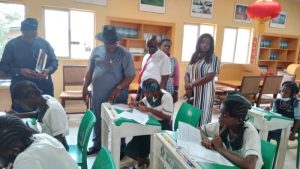
Chief Executive, NMC, Prof. promise Mebine inspecting Students during a mathematics competitionBy Jacinta Nwachukwu
Prof. Promise Mebine, the Director/Chief Executive, National Mathematical Centre (NMC), has called on mathematics stakeholders to intensify efforts towards ensuring quality teaching and learning of the subject in schools.
Mebine made the call in an interview with the News Agency of Nigeria (NAN) on Tuesday in Abuja in commemoration of the International Day of Mathematics (IDM).
He says that Mathematics has proven to be a powerful tool for understanding the environment.
It helps us to understand patterns, quantify relationships, predict the future, predict profit, and study exponential growth and decay (the rate at which things grow and die) within the context of population growth, Mebine said.
According to him, mathematics is incredibly important in human lives and is used in many professions.
Every sane person does and uses mathematics, though many do not realise that. The theme for this years celebration is Mathematics for Everyone.
Truly, Mathematics is for everyone, though many people developed a phobia for it because of the general belief that it is abstract and difficult.
It is a statement of fact that mathematics is incredibly important in human lives and is used in many professions. Every sane person does and uses Mathematics, though many dont realise that, Mebine
said.He said Mathematics is involved when people cross the road too.
For instance, when you want to cross a road and there is an oncoming vehicle, what do you do? You take the following into consideration: estimate the distance between you and the vehicle.
The speed of the on-coming vehicle, the time it will take the vehicle to reach your crossing line and the time it will take you to cross. All these must be calculated and analysed, though mentally before crossing the road.
A good cook who wants to prepare food must take into consideration the number of people to be fed, the quantity of what he or she wants to cook, the size of the pot to use, and quantities of ingredients and water to make food tasty, Mebine said.
The director said these were some of the things people do in their everyday life without knowing they were practising mathematics.
He said that the importance of mathematics in everyones life cannot be over-emphasized, hence the need to make IDM worth looking forward to every year in the country.
Mebine said for this to be achieved, the celebration should not be left in the hand of NMC and a few organisations but all lovers and users of mathematics should include it in their annual programme.
March 14 of every year is set aside for all countries of the world to participate in the celebration of the beauty and importance of mathematics and its essential role in everyones life. (NAN)(www.nanews.ng)
==========
Edited by Razak OwolabiSource: NAN News
-
adminposted in News & Trends • read more

Vice President Yemi OsinbajoBy Chijioke Okoronkwo
Vice President Yemi Osinbajo says Nigerias technology ecosystem accounts for almost 30 per cent of Africas funded ventures with no fewer than 180 startups.
Osinbajo said this at the Official Inauguration of the Investment in Digital and Creative Enterprises (iDICE) Programme and Unveiling of iDICE logo on Tuesday at the State House Banquet Hall.
The vice president said that the iDICE is a government initiative to promote innovation and entrepreneurship in the digital tech and creative industries, especially targeted at job creation.
According to him, the total fund is 618 million dollars, out of which the AFDB provides 170 million dollars, the Agence Francaise de Development, 100 million dollars and the Islamic Development Bank (IsDB), 70 million dollars in co-financing.
The Bank of Industry (BOI) will provide 45 million dollars as Federal Governments counterpart contribution to be availed through loans for qualifying startups.
We expect another 271 million dollars from private sector and institutional investors.
I think it is important to mention that private capital has usually been ahead of government effort, the last few years have seen a consistent rise in venture capital investments in Nigerias technology ecosystem.
According to Disrupt Africas 2022 Tech Funding Report, Nigeria was the best-funded country in Africa for the second year running, with a minimum of 180 startups.
Making up approximately 30 per cent of Africas funded ventures, raising approximately one billion dollars substantially ahead of all other countries on the continent on both counts.
This influx of private capital has enabled startups to expand operations and create new jobs while contributing significantly toward overall Gross Domestic Product (GDP) growth of the country.
There are of course thousands of startups that have used private funds or debt that goes unrecorded.
He said it had become imperative to commence a coordinated approach toward innovation on the continent, bringing together all stakeholders to coordinate efforts at scaling up investments and building programmes that support innovation.
Osinbajo said that the government must provide more support for startups and small businesses while investors must provide more funding.
This is why the iDICE is important, it brings together the public sector, and our development partners the AfDB, IDB, and French Development Agency.
To design a Programme that supports innovation across very critical pillars including policy, infrastructure, access to finance and talent.
These pillars have been identified as very critical to the growth and sustenance of innovation on the continent.
As a government, we have consistently provided support to the innovation ecosystem over the last eight years, he said.
He said that in 2028, the Technology and Creativity Advisory Group was set up.
The vice president said that the group brought together stakeholders in the technology and creative industries, to contribute directly to policy formulation, articulation and the design of the technology and creative sectors of our economy.
He said that in Oct; 2022, President Muhammadu Buhari signed Nigerias Startup Bill into law, making it the Nigeria Startup Act.
Osinbajo said that the Act would provide a legal and institutional framework for the development of startups in Nigeria, and provide an enabling environment for growth of startups in the country.
On his part, AFDBs President, Akinwumi Adesina, said that the digital trends held great promise to help create massive number of jobs.
According to him, estimates by Endeavor (2022) show that expanding digital infrastructure by 10 per cent will lead to a 2.5 per cent annual growth in GDP in Africa.
Furthermore, expanding access to the internet in Africa from the current 33 per cent to 75 per cent can help create 44 million jobs, including three million jobs in online services by 2025.
We are already witnessing in Nigeria the power of digital technologies, tools, and platforms. Nigeria currently has five out of the 11 digital companies that have reached the status of unicorn with market valuation of one billion dollars.
Names that come to mind include Jumia, Interswitch, Opay, Flutterwave and Andela, mainly in the fintech space, he said.
In his remarks, Lai Mohammed, the Minister of Information and Culture, said that Nigerias creative industry was not about music and film.
He said the industry comprised other sectors such as advertising, hospitality, writing, comedy, photography, hair and beauty among others.
According to him, the industry employs millions of Nigerians.
While the music and film industry have combined to put Nigeria on the world map, in terms of revenue generation, fashion generates N2 trillion against musics N200 billion, hair and beauty generates N1.52 trillion against films N140 billion.
So, I hope that when we start administering these funds, we will look at these figures and we are very glad to share this report with the advisory council, he said.
Other speakers at the event included Niyi Adebayo, the Minister of Industry, Trade and Investment, Zainab Ahmed, the Minister of Finance, Budget and National Planning and representative of Minister of Communications and Digital Economy, Isa Pantami.
Olukayode Pitan, the Managing Director, Bank of Industry (BoI), and representatives of French Development Agency and IsDB also spoke at the event. (NAN)(www.nannews.ng)
==============
Edited by Ese E. Eniola WilliamsSource: NAN News
-
adminposted in News & Trends • read more
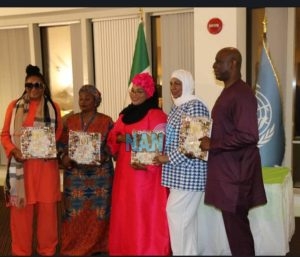
Mrs Zainab Marwa (middle) with other dignitaries at the unveiling of 101 Nigerian Women of Impact in New YorkSource: NAN News
-
adminposted in News & Trends • read more

Fire outbreak at Singer Market, KanoBy Bosede Olufunmi
The Federal Fire Service (FFS) said it would inaugurate fire stations within the markets across the country.
The Zonal Controller, FFS in charge of Kano and Jigawa, Assistant Controller General (ACG), Ahmed Garba-Karaye, stated this when he visited Singer Market to assess the level of damage caused by fire on Monday in Kano.
He said the service was committed to prevent and control fire.
According to him, investigation, Inspectorate and Enforcement (IIE) will inspect and ensure fire safety compliance in public buildings.
Rising cases of fire outbreaks in Kano market is as a result of high weather temperature and substandard electric appliances.
Excessive heat, fuel and oxygen as major catalysts of fire triangle and heat can trigger fire without the presence of fuel, kerosene or diesel, he said.
The Zonal Controller said shops should be well ventilated as congestion could also escalate heat and cause fire.
He urged market leaders to enlighten business owners through signs and announcements, the importance of switching off electric appliances before closing for business.
Garba-Karaye also called on philanthropists and wealthy individuals to contribute their quota, by providing firefighting equipment as part of their corporate social responsibilities.
He advised traders to always be at alert and conscious of fire. (NAN)(www.nannews.ng)
Edited by Emmanuel Afonne/Idris Abdulrahman
Source: NAN News
-
adminposted in News & Trends • read more

Nigerian Ports Authority (NPA) headquartersBy Chiazo Ogbolu
The Nigerian Ports Authority (NPA) has commended the Maritime Workers Union of Nigeria (MWUN) for support in ensuring salaries of NPA members of staff were increased.
The Managing Director, NPA, Mr Mohammed Bello-Koko in a statement in Lagos on Tuesday, noted that the salary of workers had been stagnated since 2008.
Bello-Koko stated this when he received a letter referenced MWUN/MD/NPA/RFC/23, dated March 6, signed by the Secretary General MWUN, Comrade Adewale Adeyanju, expressing appreciation to management of the authority for the increment in the salary of its members.
The NPA boss said that breaking the jinx of salary stagnation suffered over a decade by the authoritys employees was made possible by the support of the MWUN.
He noted that the authority remained appreciative of the support by the union.
This critical support from MWUN has buoyed us to intensify our relentless drive toward continuous improvement in the welfare of our esteemed workers in ways not limited to monthly salary alone.
We are further delighted by the fact that our own Adeyanju is now the Deputy President of the NLC.
This gives us the necessary solidarity and backing to push for more benefits for our highly valued human resources, he said.
It would be recalled that the NPA managing director had in November 2022, been accompanied by Adeyanju to pay an advocacy visit to the headquarters of the Nigerian Labour Congress (NLC) to solicit the unions solidarity toward increase in NPA workers salaries. (NAN)(www.nannews.ng)
============
Edited by Chioma UgbomaSource: NAN News
-
adminposted in News & Trends • read more

Chief of Army Staff, Lt.-Gen. Faruk YahayaBy Sumaila Ogbaje
The Chief of Army Staff (COAS), Lt.-Gen. Faruk Yahaya, has urged officers and men of the Nigerian Army to remain professional and above board in their conducts during the March 18 elections.
Yahaya gave the directive at the opening of the 4th Career Planning and Management Seminar organised by the Army Headquarters Department of Military Secretary, on Tuesday in Abuja.
The Chief of Training (Army) Maj.-Gen. Sani Mohammed represented the COAS at the seminar with the theme, Efficient Human Resource Management: Imperatives for a Professional Nigerian Army in the 21st Century.
He said the seminar was organised to ensure efficient career planning to engender good leadership among officers.
This, he said, became very imperative in view of the involvement of the army in several operations.
According to him, significant changes in organisational and leadership have evolved globally, as such it is important for the military to improve approaches to career planning and human resource management.
This would ensure a balanced and rewarding career path for officers, he added.
Yahaya said the seminar was to create awareness and sensitise officers on new policies that might impact on their career and address other salient career planning issues for better understanding.
As members of the armed forces, we should be mindful of the need to adequately prepare officers to operate in joint environment.
And deploy them to positions where they can efficiently develop novel plans, processes, strategies to meet the changing nature of the battlespace.
Therefore, it is imperative that we maintain momentum while motivating our officers and men through an efficient and balanced career planning process, the COAS said.
He also emphasised the need for all army personnel to remain apolitical and professional.
The COAS said great efforts have been made to ensure that the conduct of our officers and men during the polls remains professional and above board.
I therefore urge you to uphold the highest professional conduct during this period.
In his remarks, the Military Secretary (Army), Maj.-Gen. Jamil Abdulsalam, said the annual seminar was to ensure efficient management of the careers of army officers.
Abdulsalam said the department had overtime, observed that most officers within the mid level cadre treated matters of career with levity, often leading to unpleasant consequences.
He said that upward trend, where annual evaluation reports from formations and units as well as course reports from most army training institutions fell short of realistic reportage, had been of great concern.
According to him, the shortcomings are further compounded by the involvement of the army in wide range of operations and the resultant dearth of officers for deployment to key areas.
All of these factors have significantly affected career planning and complicated the military human resource management approach of the Department of Military Secretary.
Customarily, the department conducts sensitisation visits to Nigerian army formations and training schools, including operational areas to enhance officers understanding of the requirements for career growth.
This forum offers a unique opportunity to have a convergence of seasoned resource persons and key players in the management of army officers careers to share experiences and update you on extant policies and provisions that may impact on your careers.
The seminar will feature packages that will expose participants to contemporary approaches to military human resource management with a view to improve career planning at all levels.
The issue of conduct and discipline, which remains a key consideration in the career planning process, as well as gender perspectives have been added to make the seminar wide-ranging, balanced and rich in context, he said. (NAN) ()
Edited by Maharazu Ahmed
Source: NAN News
-
adminposted in News & Trends • read more

By Ikenna Osuoha
Save Our Heritage Initiative (SOHI), an Abuja based NGO, has advised Nigerian politicians and voters to be peaceful and play the game of politics by the rules.Ms May Ikokwu, Chief Executive Officer (CEO) of the group gave the advice in an interview with the News Agency of Nigeria (NAN) in Abuja on Monday.
Ikokwu urged them not to allow their personal ambitions jeopardise the unity and peace of the country especially during the forthcoming governorship and state assembly elections .
She appealed to the political class not to exploit the countrys diversity negatively to advance their personal ambitions.
We should emphasise those things that unite us more than the ones that divide us.
Politics is a game that will come and go but Nigeria remains, so let us prioritize Nigerias unity and harmony above personal ambitions.
Clean politics is part of our heritage and a legacy that we should aspire to leave for the future generations, she advised.
The Culture Advocate who warned against political violence and animosity, said that it was alien to Nigerias indigenous political culture.
She urged politicians to close ranks among each other in accordance with Nigerias culture of brotherly love.
Ikokwu also called on the Independent National Electoral Commission (INEC) to restore confidence of the electorate by allowing votes count.
She explained that only transparent and credible election would truly reflect the will and wish of the people.
According to her, Nigeria should demonstrate their position as giant of Africa by conducting peaceful, credible gubernatorial elections.
Ikokwu however commended Nigerians for their commitment to stronger democratic process.
The News Agency of Nigeria (NAN) reports that Nigerias Gubernatorial elections would be conducted on March 18. (NAN) www.nannews.ng
=======
Edited by Auwalu Birnin Kudu/Ekemini Ladejobi
Source: NAN News
-
adminposted in News & Trends • read more
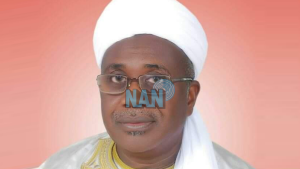
By Thompson YamputThe Hydro-Electricity Power Producing Areas Development Commission (HYPPADEC) on Monday in Lokoja inaugurated its operational office in Kogi.
The office was donated to the commission by the Kogi Government to assist HYPPADEC to execute its assignment to the 10 flood proned local government areas in the state.
Inaugurating the facility, Representative of the commissions Governing Board, from Kogi, Alhaji Isa Ozi-Salami, described the occasion as laudable and heartwarming to the entire people of Kogi.
What were doing here today is facilitating capacity building and to enhance communication between the commission and the people of Kogi.
What HYPPADEC is doing across the six benefiting states across the country is serving humanity as many lives, particularly the poor masses, are being touched and uplifted.
Thanks be to God for the man behind the Commissions success story in the person of Alhaji Abubakar Yelwa, the Managing Director, who is a genius in service to humanity, he said.
Yelwa, in his speech, thanked Gov. Yahaya Bellos administration for providing the operational office for the commission, describing it as an encouraging gesture that can create the enabling environment for better service.
The HYPPADEC boss said that the commission would use the edifice for five years after which it was expected to build and move into its own permanent office.
As we appreciate this government for this gesture, as Oliver Twist, we are asking for a piece of land on which we can build our permanent office in the state.
In the area of health, we intend to carry out another round of medical outreach programmes for the benefiting 10 flood affected LGAs in the state immediately after the Ramadan fasting.
We have got approval from the governing board to provide electricity to over 200 communities in conjunction with the state government, he said.
Yelwa said that the commission would do more for the youths in the areas of empowerment, scholarship and capacity building as they are our future leaders and deserved to be assisted to fulfill their destiny.
Bello described HYPPADEC as a household name in Kogi considering the quantum of assistance it had rendered to the people of the state.
Represented by the State Environment Commissioner, Mr Victor Omofayle, the governor promised to continue to partner the commission to ensure that lives of people of Kogi were improved.
NAN reports that youths from the 10 benefiting LGAs, who were in the venue with placards of various inscriptions of praises, honoured the managing director with an award for his outstanding performance. (NAN)
Edited by Gregg Mmaduakolam/Muhammad Suleiman TolaDD/Website
-
adminposted in News & Trends • read more

By Sumaila Ogbaje
The Nigerian Army says its officers and men were firm and resolute in providing security support during the just concluded Presidential and National Assembly elections.
The Director, Army Public Relations, Brig.-Gen. Onyema Nwachukwu, said this in a statement on Monday in Abuja.
Nwachukwu dismissed smear campaign in the social media and other fora against some senior commanders and officers, as sheer mischief.
He said that the Armys firm and resolute stance in providing security support for the elections effectively curbed and prevented ill-intentioned groups from violently interfering with the process.
There is no doubt that Nigerians are excited at this responsible posture and the democratic opportunity it offered them.
However, some interest groups that were effectively prevented from hatching their nefarious plots to influence the course of the elections through violence, are understandably piqued by this assertiveness of the Nigerian army.
The Army spokesman said the Nigerian army was nationalistic in its make-up and organisation, drawing strength from the nations diversities as constitutionally conceived.
He explained that the responsibilities of the army in elections was to support primary law enforcement and election stakeholders, to ensure that Nigerians choose their leaders and representatives in a peaceful manner.
This goal, according to him, remains armys only focus and one it will continue to pursue, mindful that the average citizen expects nothing less from it.
Nwachukwu assured the public that any misconduct against any personnel would be responsibly investigated.
He added that any personnel found culpable would face appropriate disciplinary sanctions in accordance with established practices and extant laws.
Nwachukwu however warned that the Army would not allow the character and reputation of any senior officer, earned over three decades of meritorious service, to be destroyed by misguided elements through mere speculations.
The resort to the sentiments of ethnic and religious colourations would not also diminish the Nigerian armys resolve to carry on its roles professionally.
The Nigerian Army, therefore, urges all Nigerians to ignore the mischief being propagated by ill-intentioned individuals and groups and continue to go about their civic responsibilities without any fear of molestation.
We would continue to work with sister Services and other Security Agencies to meet all security-related expectations of citizens as enshrined in the laws of the Federation, he added. (NAN) ()
Edited by Maharazu Ahmed
=========
Source: NAN News
-
adminposted in News & Trends • read more
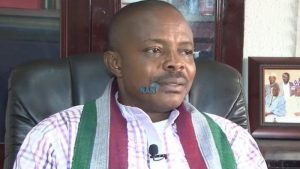
NLC President, Mr Joe AjaeroBy Joan Nwagwu
NLC plans to order workers to sit at home if in seven days the Federal Government fails to address current cash crunch.
Its President, Mr Joe Ajaero, made the declaration on Monday in Abuja at the end of an emergency meeting of the Central Working Committee of the NLC.
He noted that Nigerians had suffered enough from the cashless policy of the CBN.
The NLC is giving the Federal Government and agencies under it, including the CBN and other banking institutions seven working days to address the cash crunch.
If they fail to do so at the expiration of the seven working days, the Congress is directing all workers in the country to stay at home.
This is because it has become very difficult to access even one naira, especially by traders who do not have bank accounts.
We have also discovered that even when banks give out old currencies, they cannot be spent. Even when you take them back to the same banks, they do not accept them.
We have been frustrated to a level that we can no longer keep quiet, Ajaero said.
The NLC president also lamented difficulties being experienced at petrol stations.
At fuel stations where there is petrol, it sells for as much as N350 a litre in some parts of the country.
We will no longer be quiet about this issue of perennial fuel scarcity and arbitrary increase in prices, he said.
On the on-going state council elections of the NLC, Ajaero said some state governors were interfering with the process.
Some state governors now dictate to the NLC through the chairmen in those states, he said.
He alleged that a governor in one of the states in the Southeast openly campaigned that NLC members should vote for a particular candidate.
He explained that NLCs attempt to resist the approach was met with the manhandling of its officers by hoodlums engaged by the state government.
They disrupted our election in that state. Our state secretariat has been destroyed by thugs sent by the governor.
The thugs took over that place for three months. The state chairman of the NLC was driven out of the state, he said. (NAN)(www.nannews.ng)
========
Edited by Alli HakeemSource: NAN News
-
adminposted in News & Trends • read more

Old naira notesBy Stephen Adeleye
The officials of Kogi Government and Stakeholders in the financial sectors, have sensitised Kogi residents on the need to accept the old naira notes in line with the Supreme Court judgment.
The News Agency of Nigeria (NAN) recalls that the Supreme Court on March 3, ruled that the new and old naira notes should co-exist as legal tender in Nigeria till Dec. 31.
Addressing a large crowd at the newly constructed Ganaja Flyover on Monday in Lokoja, the State Commissioner for Information and Communications, Mr Kingsley Fanwo, congratulated Nigerians on the Supreme Court judgment.
Fanwo said the people could now use both the old and new naira notes together till Dec. 31, 2023.
We have met with the banks and they have agreed that they will accept old naira notes as deposits.
So, we urge all commercial motorcycle riders, Keke riders and market men and women to accept the old naira notes.
The state government is grateful to the banks for their cooperation and commitment to the ruling of the Supreme Court of Nigeria.
It is criminal to reject old naira notes after the judgment, Fanwo said.
He assured that the state government would monitor the compliance strictly.
Also speaking, the State Security Adviser, Cmdr. Jerry Omodara (rtd.) harped on the need for residents to cooperate with the state government in its bids to ease the current financial strains occasioned by the current cash policy.
Omodara said his office would work with security agencies to ensure compliance.
In his remarks, Mr Idris Asiru, the Kogi Commissioner for Finance and Budget Planning, said the banks were already accepting old naira notes as deposits.
Asiru urged the people to take advantage of the cooperation of the banks.
He said that he had already gotten the commitment of the banks to load their ATMs with old and new naira notes to ease the cash scarcity in the state.
The representatives of the major banks in Lokoja also assured the people of the readiness of the banks to accept old naira notes as deposits.
They said the directive took effect from Monday morning, urging customers to freely accept the old naira notes.
NAN reports that the sensitisation train visited all transport unions, fuel stations and major markets in Lokoja.
The stakeholders assured Kogi people of sustained sensitisation on radio and other media of communication. (NAN)(www.nannews.ng)
=========
Edited by Chioma UgbomaSource: NAN News
-
adminposted in News & Trends • read more

National Sports for JudiciaryBy Fabian Ekeruche
The Civil Society Network Against Corruption (CSNAC) has called on President Muhammadu Buhari to sanitise the judiciary by removing corrupt judges reinstated by the National Judicial Council.
This is contained in a statement by CSNAC Chairman, Olanrewaju Suraju, on Sunday in Lagos.
Suraju said that the reinstatement of Justices Rita Ofili-Ajumogobia, James Agbadu-Fishim and Nasir Yinusa was a sabotage on the war against corruption in the judicial system.
He said that Ofili-Ajumogobia was arrested and investigated by the Economic and Financial Crimes Commission (EFCC) for alleged corrupt practices and abuse of office.
The President approved her dismissal from public service, but the National Judicial Council reportedly reinstated her as a Judge of the Federal High Court despite her dismissal not being overturned by any court in Nigeria.
Similarly, the National Judicial Council also reinstated Justice Agbadu-Fishim as a judge despite his arrest and investigation by the EFCC for alleged corruption and subversion of justice.
The National Judicial Council had recommended his dismissal to the President for judicial misconduct, but later decided to reinstate him as a judge of the Council.
Despite previously indicting him for gross misconduct and recommending his retirement to the President, the Council had placed Justice Nasir Yinusa on suspension, pending the approval of the recommendation, but surprised many by reinstating him, the statement said.
According to the coalition, the Judicial Council has no legal right to reinstate judges who were previously indicted for misconduct.
The coalition added that the Council had overstepped its bounds by ignoring the recommendations to retire the judges, but rather proceeded with their reinstatement.
The President is required by law to accept or reject the recommendations made by the Council, and that the Council does not have the power to unilaterally reinstate judges who have been indicted for misconduct, Suraju said.
He noted that the coalition had written to the President to approve the retirement of Justice Nasir Yinusa on the recommendation of the National Judicial Council and direct the Council to reverse the illegal reinstatement of Mrs Rita Ofili-Ajumogobia and Mr. James Agbadu-Fishim as judicial officers in Nigeria.
He added that copies of the letters were sent to the Vice President and Attorney General of the Federation. (NAN) ()
Edited by Abdulfatai Beki/Vincent Obi
Source: NAN News
-
adminposted in News & Trends • read more
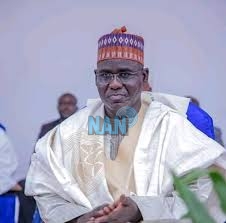
By Sumaila OgbajeFormer Chief of Army Staff retired Lt.-Gen. Tukur Buratai, has congratulated Nigerians on the election of Sen. Bola Tinubu as the President-elect, saying his victory was a clear reflection of the will of the people.
Buratai, who is the immediate past Nigerian Ambassador to Benin Republic and a Chieftain of the All Progressives Congress (APC), made the call in a statement on Monday in Abuja.
He also called on Nigerians to vote all APC candidates in the March 18 Governorship and House of Assembly Elections across the country.
Buratai commended the Independent National Electoral Commission (INEC) under the leadership of Prof. Mahmood Yakubu for presiding over an election in a country with the largest democracy in the African continent.
According to him, it is a job well planned and professionally executed.
He stated that the vote of all Nigerians had the power to make a difference and consolidate on the wise choice made during the presidential election.
At this juncture, I say with all sense of responsibility that our collective future is assured under the renewed hope vision and mission of Asiwaju Bola Tinubu.
I believe the President-elect is a man of capacity, empathy, vision, and all that it takes to lead Nigeria to the promised land.
Therefore, I encourage all Nigerians to vote for the APC in the forthcoming governorship elections at the states levels so that the APC can have a majority at all levels.
Do not be part of the minority opposition as we already have the APC at the Centre.
Continuity has been achieved at the Federal level with the emergence of Asiwaju Bola Ahmed Tinubu as the President-Elect from the APC.
Therefore, for effective policy implementation, progress security and development of our country, also vote APC at the states levels. Nigeria shall be great by the Grace of God, he said. (NAN) ()
========
Edited by Sadiya Hamza
Source: NAN News
-
adminposted in News & Trends • read more
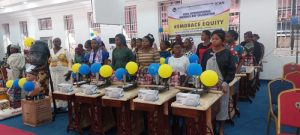
Start-up materials given to women entrepreneurs to mark 2023 International Womens DayBy Philomina Attah
The Society of Women Accountants of Nigeria (SWAN), Abuja Chapter, has empowered 32 widows, single mothers and young girls with relevant start-up materials to be self-employed and eventually employers of labour.
Chairperson of the association, Miss Joy Esu, in Abuja said that the gesture was to also mark the 2023 International Womens Day.
Esu said that the Society had carefully put together the programme to celebrate and empower the women folk on this all-important event focusing on gender equity, embracing diversity and inclusion to help forge an equal world.
She added that the beneficiaries were carefully selected from different sub-urban settlements within the FCT and its environs, adding that every one of them truly deserved the empowerment scheme.
This was made possible through their engagement in skill-acquisition training and we assistance them with start-up capital.
The next phase is a Skill Acquisition Programme for the beneficiaries.
This is with the view of empowering them with relevant skills and seed capital to help them to commence a Business and to be able to sustain themselves and their families economically.
This is planned in anticipation that we will be able to raise the desired financial support from our partners/supporters, she said.
She further explained that the beneficiaries would be train on book keeping, accounting and financial management to help them manage the financial records for their Businesses.
According to her, SWAN is an arm of the Institute of Chartered Accountants of Nigeria (ICAN), whose membership is open to female members of the Institute.
She explained that the Society served as an integral part of the Institute to meet the yearnings and aspirations of women for recognition, creating opportunities and an enabling environment for the promotion of socio-economic development of women.
We have carried out sensitisation programmes and career talks in six secondary schools within Abuja and its environs.
The aim is to elicit the interest of the young ones to embrace Accountancy as a Career Path and also inculcate in them self-dignity, discipline and integrity.
We have also organized sensitisation lectures to undergraduates in Four Tertiary Institutions within FCT and environs on the Career Path of becoming a chartered accountant, she added.
She further listed other projects executed by the organisation to include medical outreach, orphanage visitation, hospital visitation, prison visitation and anti-corruption advocacy, among others.
Prof. Adesoji Adesugba, the Managing Director, Nigeria Export Processing Zones Authority (NEPZA) commended SWAN Abuja Chapter for the laudable gesture, urging other states to key into such scheme in order to empower more women in the society.
Adesugba, who was represented by Dr Martins Odeh, Head, Corporate Communication, NEPZA, said that education was very important for a woman, adding that, but if you do not have a formal education skill acquisition like this is very important.
There is no society without assistance and there is no society without a woman because it has been measured that a womans management ability is much more than that of a man.
It is said that when you empower a man, you empowered a family alone but when you empowered a woman you have succeeded in empowering both the family and the entire nation, he said
The managing director urged women to press on and do not look at anything that would distract them from achieving their set goals.
He equally advised the beneficiaries to use the support given to them today judiciously and ensure they extend helping hand to those not opportune to be selected.
Mrs Bright Okorie, responding on behalf of the beneficiaries appreciated SWAN Abuja Chapter for the support given to them.
The News Agency of Nigeria (NAN) reports that items donated to the beneficiaries included, sewing machines, electric irons, hair dryers, baking materials among others.
NAN also reports that the beneficiaries were educated on financial integrity to enable them to operate successful businesses with the items. (NAN)(www.nannews.ng)
========
Edited by Isaac AregbesolaSource: NAN News
-
adminposted in News & Trends • read more

Crude Oil theft in NigeriaBy Sumaila Ogbaje
The Niger-Delta Safe Environment Group (NSEG) has lauded the Nigerian military on its increased operations aimed at curbing oil theft in the region.
This is contained in a statement on Monday by Mr Ombo Princewill and Felicia Akpabio, President and Secretary of the group, respectively, in Abuja.
The duo said that long years of illegal oil bunkering had caused severe damage to environment and health of people in the region.
They lamented that several residents were afflicted with illnesses as a result of massive environmental degradation caused by the activities of oil thieves.
The officials, however, said that military onslaught by troops of Operation Delta Safe had weakened the activities of the criminals.
According to them, the activities of the Armed Forces, under the Chief of Defence Staff, Gen. Lucky Irabor, have helped to protect the environment and save huge resources for the country.
Just last week, the Defence Headquarters announced that it discovered and destroyed 74 illegal refineries and arrested a total of 71 criminals terrorising the zone.
In addition, the troops have also recovered 209,000 litres of crude oil, 145,000 litres of Automotive Gas Oil, 4,500 litres of Premium Motor Spirit, 27 variety of weapons, 468 assorted ammunition, 2 speed boats, 2 outboard engines, 8 vehicles and 4 motorcycles.
We commend the AFN for operations conducted at the creeks, waterways, high sea, towns and cities of Bayelsa, Delta, Rivers, Cross River and Akwa Ibom states, which yielded appreciable results.
For long, misguided elements in our region have put our health at risk in their quest for illegal wealth. Women with pregnancy are affected, there are incidences of lung cancer.
Not to be mentioned is the manner our sources of livelihood, fishing and farming, have been greatly affected, the officials added.
They urged people of the region to cooperate with the military in tackling those degrading the environment, causing health hazards and bleeding the countrys economy. (NAN) ()
Edited by Deborah Coker/Maharazu Ahmed
Source: NAN News
-
adminposted in News & Trends • read more

Bola TinubuThe President, Read and Earn Federation (REF), Prince Abdulsalami Ladigbolu, has called on president-elect Bola Tinubu to plan for the development of local talents for global success.
Ladigbolu made the call in an interview with the News Agency of Nigeria (NAN) in Abuja on Monday, while congratulating Tinubu on his victory at the presidential elections.
He said that Tinubus emergence at this crucial time in Nigerias history was indeed timely, adding that his emergence would be a litmus test that must overcome all the shortcomings, brimstone and negativity that had stained the status of Nigeria.
As a concerned citizen and strong believer and supporter of smart intellectuals, who believe in inter-generational mentorship and solidarity, I put forward to you my opinion about the plight of Nigerian youth and the urgent action that needs to be taken to ensure our youth achieve global success.
I believe that there is no keener revelation of societys soul than the way in which it treats its youth because discouraging them is simultaneously destroying the nations prosperity.
This is because Nigeria at present is caught between a slippery muddy cliff and a distant rocky fall and the ultra-light beam for sustainable development for a nation, starts with the mental acceptance of a working ideology conceived by the nations leadership and its subordinates.
Nigeria is one of the worlds largest producers of crude oil and with an abundance of gas and mineral resources, Nigeria is Africas largest economy.
The International Monetary Fund (IMF) predicts that Nigeria could become the ninth-largest economy in the world by 2050 if it mobilises its 200 million population into a nation of entrepreneurs and producers, he said.
According to him, Nigerias population advantage can become its Achilles heel as it currently struggles to overcome rising unemployment, unstable power supply, poor education and poverty.
Ladigbolu said Nigeria had a range of issues ranging from governments fiscal deficit which is expanding above budget, unemployment that is trending upwards and uncertainty around petrol prices all combine to create an atmosphere of economic instability.
This uncertainty means that the West African nation has seen a steady outflow of its most promising young talent to Europe, leaving behind a damaging human capital problem.
With an entrepreneurial deficit, the country is unable to develop the broad-based economy needed to provide employment, competition, and innovation as well as insulation from the global price and demand shocks in its natural resource markets.
Mass unemployment and poverty means that many Nigerians lack the basic amenities of life and are vulnerable to crimes such as human trafficking and modern-day slavery.
Furthermore, Nigerias youth population sits precariously at over 55 per cent of the total population, he said.
Ladigbolu said Nigerias youth population boasts some of the most original creative in the world, saying that if given the right tools and environment, Nigerian youth could compete at the highest levels in various industries and exceed expectations.
He, therefore, called for a meaningful enrichment and sustainable programmes in four identified critical areas among the youth such as intellectual, leadership, economy and digital technology capacity building.
He said this would contribute to and accelerate the provision of such improved competencies and capabilities that would in turn enhance the enlightenment of Nigerian youth about the dynamics of international markets. (NAN)(www.nannews.ng)
Edited by Celine Damilola Oyewole/Grace Yussuf
Source: NAN News
-
adminposted in News & Trends • read more
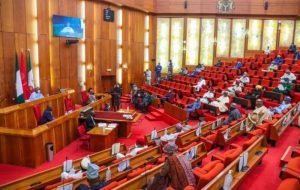
Nigerian SenateBy Naomi Sharang
The Senate is to resume plenary on Tuesday (March 21), the Clerk of the Senate, Mr Chinedu Akubueze, has said.
A statement issued by Akubueze on Monday in Abuja said that the plenary had been rescheduled from March 14 to March 21.
He said: This is to inform all Senators of the Federal Republic of Nigeria that the resumption of the Senate in Plenary has been rescheduled from Tuesday, March 14 to Tuesday, March 21.
All senators are by this notice requested to resume sitting in plenary on Tuesday, March 21, by 10 a.m prompt.
The News Agency of Nigeria (NAN) reports that the Senate had on March 2, suspended plenary to March 14, to enable senators participate in the the Governorship and State Houses of Assembly elections.
The election which was slated for March 11 was postponed to March 18 by the Independent National Electoral Commission. (NAN)()
Edited by Dorcas Jonah/Muhammad Suleiman Tola
Source: NAN News